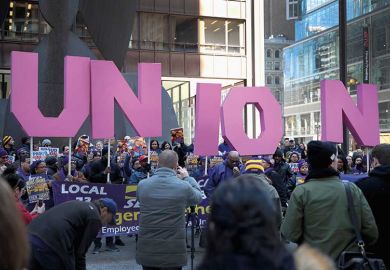Ruskin College may have become “only a fraction” of what it once was, but there is cautious optimism about plans to “re-energise” it.
The college, founded in 1899, has an unusual place within British post-school education. It is based in Oxford, although it is independent of the university, and offers adult learning to people of all ages and backgrounds” and “university-standard education and facilities, without the need for qualifications”, maintaining particularly close ties with the trade union movement.
Yet it was announced last month that Ruskin will become part of the University of West London, after facing “financial challenges”. So how did things come to this and what might it mean for the college’s distinctive traditions and values?
Anthony Woodman, UWL’s deputy vice-chancellor, said that the university had been approached by the college’s leadership after the suspension of a social work degree programme left 20 students unable to complete their studies.
“In light of…our experience integrating higher education and further education in one institution, we were viewed as a capable partner that could offer these students the opportunity to complete their studies, which, in turn, became a reason we were approached to acquire the college,” Professor Woodman said.
Moray McAulay, a regional official for the University and College Union, said that Ruskin had been “a very troubled institution for really quite some time”, with “long-standing problems accelerated by Covid”, and was now “only a fraction of what it had been”.
Furthermore, although Ruskin College was still a major player in trade union education, Mr McAulay suspected that it had suffered “reputational damage among the union movement” as the result of UCU’s “very bitter trade dispute with it about victimisation of trade union representatives”, only resolved in December 2020, “because obviously UCU was talking to other unions”.
By the time the college was “rescued” by UWL, Mr McAulay claimed, it was “dependent on bailouts from the Education and Skills Funding Agency, which ran out on 31 July, so the expectation was they would be going into administration if a partnership was not found”.
It was very understandable, therefore, that the core response of staff to the news that Ruskin would be “rescued” by UWL was “a sense of relief”.
Mr McAulay welcomed assurances, both public and behind the scenes, that the university was not engaging in “an asset-stripping exercise” or planning to “just take the [Ruskin] brand to London”. Yet he also hoped to see a reversal of recent trends, with higher education, including higher education for unionists, “rebuilt at Ruskin College”, since “in practical terms, there isn’t terribly much HE left”.
Although Ruskin College would become “part of the University of West London Group”, Professor Woodman explained, they were “determined to ensure that its Oxford campus remains an inclusive centre of education, with both teaching and research taking place there”, while looking at “how Ruskin students can also benefit from the additional facilities and faculty at our other campuses”.
UWL, said Professor Woodman, was “determined to re-energise Ruskin College” and to “see trade union education continuing” there as “an important part of the organisation’s heritage”. Yet although the university’s “robust financial position” had enabled it to “resolve” Ruskin’s “significant liabilities”, it was “clear that certain things will need to change to ensure the college can continue its mission over the long term”.
The university was “working closely with the college’s faculty on how [they] might jointly take the organisation forward”, yet it was still “too early to say what this all might entail”, he added.
Register to continue
Why register?
- Registration is free and only takes a moment
- Once registered, you can read 3 articles a month
- Sign up for our newsletter
Subscribe
Or subscribe for unlimited access to:
- Unlimited access to news, views, insights & reviews
- Digital editions
- Digital access to THE’s university and college rankings analysis
Already registered or a current subscriber?







